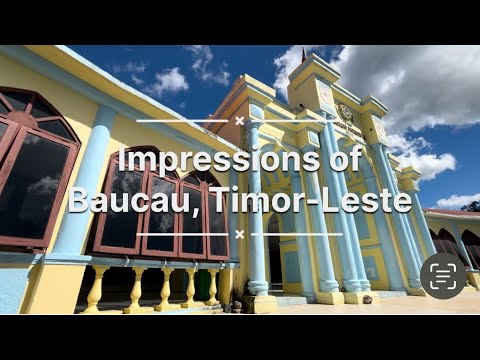
Nestled on the northeastern coast of Timor-Leste, the town of Baucau holds a charm that captivates the heart of those who venture beyond the more frequented tourist paths. As the second-largest city in Timor-Leste, Baucau offers a unique blend of historical richness, natural beauty, and cultural diversity, making it a compelling destination for travelers seeking an authentic experience.
**Historical Significance and Architectural Heritage**
Baucau’s history is etched into its colonial-era buildings and ancient ruins. During Portuguese rule, which lasted until 1975, Baucau was an important administrative center. This period left a lasting architectural imprint on the town with structures such as the old town market (Mercado Municipal) which dates back to the Portuguese era. The market with its iconic stone architecture now stands as a silent witness to the days gone by.
Another notable historical site is the Pousada de Baucau, also known as Pousada de Bucoli. This picturesque hotel is perched on a hilltop offering breathtaking views of both the city and the sea. The building serves as an emblematic example of Portuguese colonial architecture and provides insight into the luxurious lifestyle during colonial times.
**Natural Attractions**
Beyond its rich history, Baucau is surrounded by natural wonders that beckon exploration. To the north, pristine beaches like Wataboo Beach provide perfect spots for relaxation or snorkeling in clear blue waters. The region’s rugged coastline is dotted with hidden coves and expansive white sand beaches that remain relatively untouched by tourism.
Inland from Baucau lies a landscape dominated by lush forested hills and dramatic cliffs. Trekking enthusiasts will find numerous trails winding through this verdant backdrop, offering panoramic views and encounters with local wildlife.
**Cultural Fabric**
Baucau is not only diverse in terms of its geography but also in its cultural makeup. The city boasts a vibrant community composed of various ethnic groups including Tetum, Makasae, and Portuguese influences. This cultural mosaic is most vividly displayed during local festivals where traditional dances are performed, Timorese music fills the air, and crafts are showcased.
Visiting during such festivities provides a unique opportunity to engage directly with local traditions and understand the community spirit that defines this region.
**Local Cuisine**
No visit to Baucau would be complete without indulging in its local cuisine which mirrors its cultural diversity. Corn staples often accompany fresh seafood brought daily by local fishermen from nearby coasts. Dishes such as “ikan sabuko” (spicy tamarind fish stew) are popular among locals and offer an authentic taste of Timorese flavor profiles.
**Future Prospects**
Despite its myriad attractions, Baucau remains relatively underdeveloped in terms of tourism infrastructure compared to more popular destinations like Dili or Atauro Island. However, this gives it an untouched allure that may appeal especially to adventure travelers looking for destinations off the beaten path.
As Timor-Leste continues to grow economically and politically stable post-independence from Indonesia in 2002, there’s potential for sustainable development within its tourism sector which could include improvements in facilities around Baucau without compromising its historical integrity or natural beauty.
**Conclusion**
Baucau offers more than just sights; it presents feelings —of nostalgia through colonial architecture, exhilaration amidst nature’s beauty— all while wrapped in warm hospitality offered by locals proud of their heritage yet welcoming change. For those willing to travel beyond common routes, Baucaulays out an enriching narrative waiting to be experienced firsthand.
